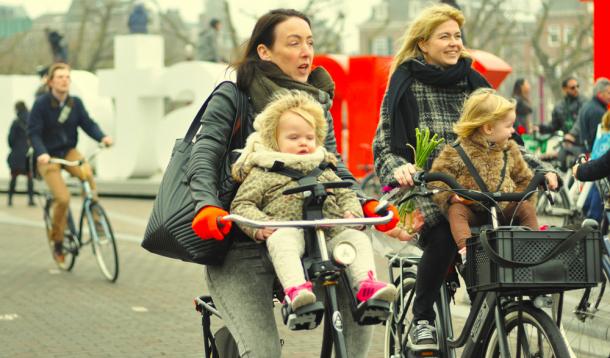
I’m five years-old and I’m in a small a town in northeastern Netherlands, visiting family with my parents.
It’s late afternoon and some neighbourhood kids are riding bicycles on the paths that run beside my aunt’s house. I ask my uncle if he has any spare fietsen (bikes) in the schuur (shed) behind his garden. He does, but they are all too large, except for one that – if modified – should do the trick. He and my father make some adjustments while my mother and her sister enjoy a relaxing cup of tea. Moments later, I pedal past the house, sitting on a bed pillow strapped to the seat post of a too-large Dutch bike…
That moment in time sums up my childhood and my parents laid-back approach to childrearing. I grew up knowing that if there was a problem, you solved it, and I learned early on that you shouldn’t worry about what others thought about you and your giant white cushion.
Although I was born in Canada, both my parents, all of my aunts and uncles, and several of my cousins were born and raised in The Netherlands. I’ve also spent a fair amount of time in Holland and needless to say; I’m perpetually surrounded by Dutch folk.
So it was of great interest that I read this commentary suggesting that Dutch mothers are among the most relaxed in the world. The article cites studies including one conducted by Unicef, which provides a comprehensive assessment of child well being in 29 countries of the industrialized world. One of the key findings is that 95% of kids in The Netherlands report having a high level of life satisfaction.
Ninety-five percent.
Let that sink in for a moment.
By comparison, children in Canada and the US, find themselves in the bottom third of the “happiness” chart. Additionally, 84% of Dutch kids say they have good relationships with their parents and peers compared to just 66% of Canadian kids and 63% of American kids.
What gives?
Are Dutch kids really so content? And if so, why?
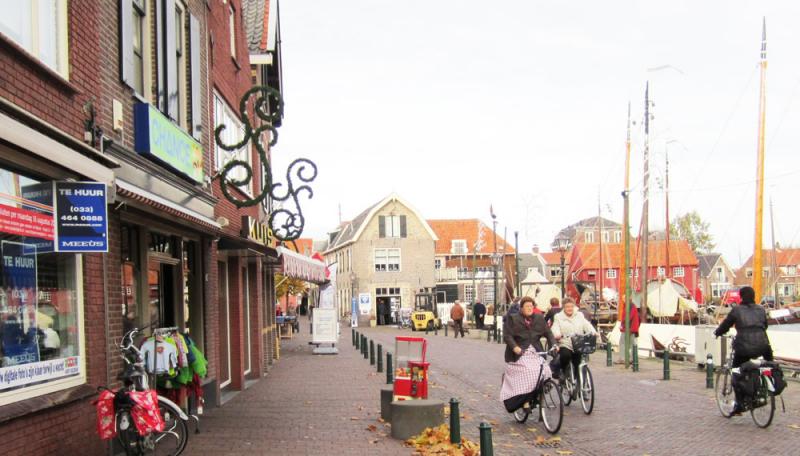
The second time my daughter was in Holland, she looked out the train window and said, “Look! It’s a bike race!” In fact, it was just a regular day with regular people heading to work, the market or to school. People of all ages in The Netherlands ride their bikes all over the place, and we all know about the positive effects exercise and being outdoors has on the brain. Meanwhile, with schools, bakeries, shoe stores, clothing stores and restaurants located in every single community - from small towns to big cities - there are always lots of amenities nearby, which means mothers don’t need to cram their unwilling toddlers into car seats so they can sit in heavy traffic in order to get to Costco to buy toilet paper.
When you are physically active, you can afford to indulge. So, in The Netherlands, when you visit someone’s home for tea, or you buy a cup of koffie in a café, it comes with a gebak (pastry), koekje (cookie) or chunk of chocolade (chocolate). You don’t have to ask for or pay extra for these treats. They are included. In fact, they are expected. And, don’t even get me started on mokka punten and hagelslag.
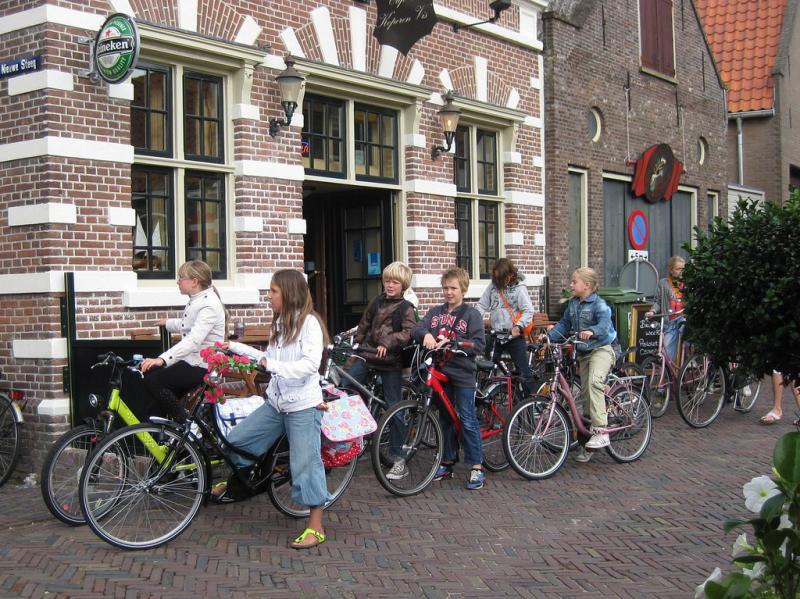
In Holland, family time is cherished. It’s part of their child-centred culture. There are playgrounds and kinderboerderijen (petting farms) everywhere, schools are designed with kids in mind and homework is virtually non-existent before the age of ten. This gives young people lots of free time for unstructured play. Additionally, Dutch children are very much part of the family unit and are often included in parental conversations. Their voices are heard and their opinions are valued.
As a pre-teen, whenever I brought a boy to my parent’s shop to say hello, my mother would look him up and down and say, “Nice to meet you. If you're going out with my daughter, there will be no penetration.”
I used to think this kind of talk was normal. Until I realized it wasn’t.
The fact is, the Dutch are blunt and topics of conversation are wide open. Sex, drugs and alcohol are discussed at the dinner table as freely as the weather or how delicious the pea soup tastes. As a result, Holland has some of the lowest rates of teen pregnancy, alcohol consumption and drug use in all of the developed nations. Meanwhile, Canada’s young people have the highest rate of cannabis use (28%) and the United States has some of the highest rates of teenage births (more than 29 per 1000 compared to the Dutch rate of 2 per 1000).
As one writer put it, “Dutch parents treat teen sex much as Dutch society treats drugs or prostitution: permit it, hug it close, control it.”
As a rule, Dutch people don’t get too stressed out about too many things. It’s why you don’t typically see mothers yelling at their kids to hurry up at the supermarkt (grocery store) and the reason you see four year olds walking around with soothers pinned to their sweaters. There is a live-and-let-live attitude that permeates Dutch society and along with it comes an acceptance of one other. Dutch moms don’t over-stimulate their babies, they don't push their children to be the best, and they don’t worry about how other kids are doing in comparison to their own. Don’t get me wrong, education is extremely important to the Dutch. However, a child’s self worth is not tied to his grade point average and “keeping up with the Joneses” is a bit of a foreign concept.
Instead, regularly scheduled rest, healthy food and a safe home environment are the top priorities for Dutch parents. Trying to be "different" or "better" is not an option.
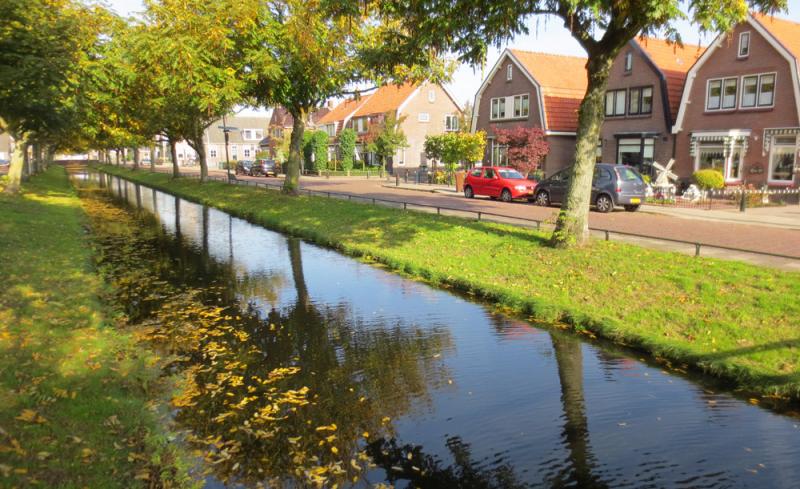
Holland is full – and I mean full – of water. Still, you don’t see big, high railings surrounding the canals which are present is so many of the communities. Yet, each car has a small ax located near the driver, in case of an off-road emergency. This is a lovely metaphor for the Dutch parenting philosophy: If you fall in, the least we can do is give you a way out.
The Dutch have some of the highest rates of part time workers in the world. In fact, 26% of Dutch men and 76% of Dutch women are employed fewer than 30 hours per week. And they aren’t all working in fast-food restaurants… those numbers represent even those in those in upper management positions. Compare that to 11% of Canadian men and 26% of Canadian women who work part time.
The Dutch do have a well-developed safety net which makes the decision to work shorter hours (thus leaving more time for family) an easy one, but at the end of the day, mothers and fathers aren’t criticized for their choices, whether they choose to work full-time or part-time. And because fathers can also work shorter weeks, there is a tendency for them to participate in daily family life. I remember my father always cleaning up after supper, likewise with my uncle who still lives in Holland. Dutch dads participate in school drop offs and pick-ups and are far more present than their North American counterparts and Omas and Opas (grandparents) are important family figures.
(Hint: the answer is yes)
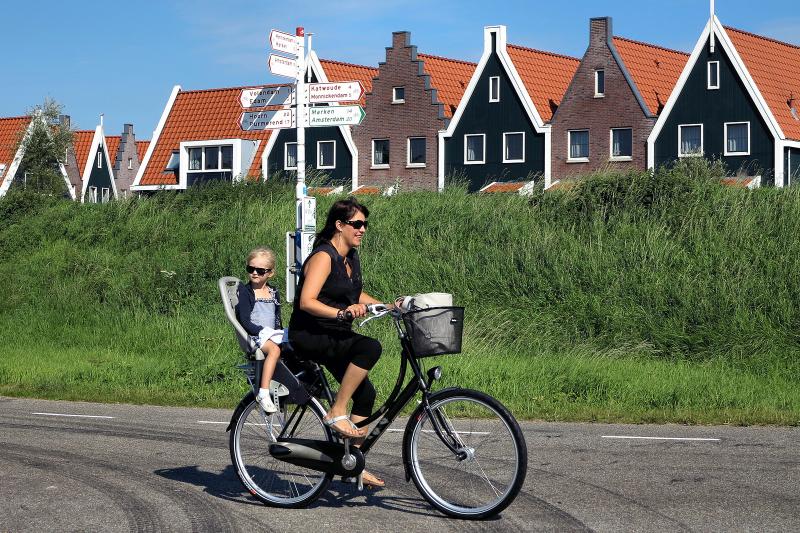
If you’re a Dutch moeder (mother), there’s a lot to be happy about according to Ellen de Bruin, a Dutch psychologist and journalist. "Personal choice is key,” says de Bruin in this New York Times article. “In the Netherlands people are free to choose their life partners, their religion, their sexuality... we can pretty much say anything we like. The Netherlands is a very free country."
And therein lies the answer.
Freedom - true freedom - is the secret to geluk (happiness).
Back at my aunt’s house, I announce that some of the kids have been calling me names. My mother arms me with a few new Dutch words and sends me back out the door. “Tell them they are all ‘stom’ (stupid).”
As I hurl insults, I continue to be teased until I change my approach and ask “Wil je met mij spelen?” (Will you play with me?).
Then, I happily ride with them until dusk.
![]() RELATED: F*ck Balance. Here’s How I Found Happiness
RELATED: F*ck Balance. Here’s How I Found Happiness